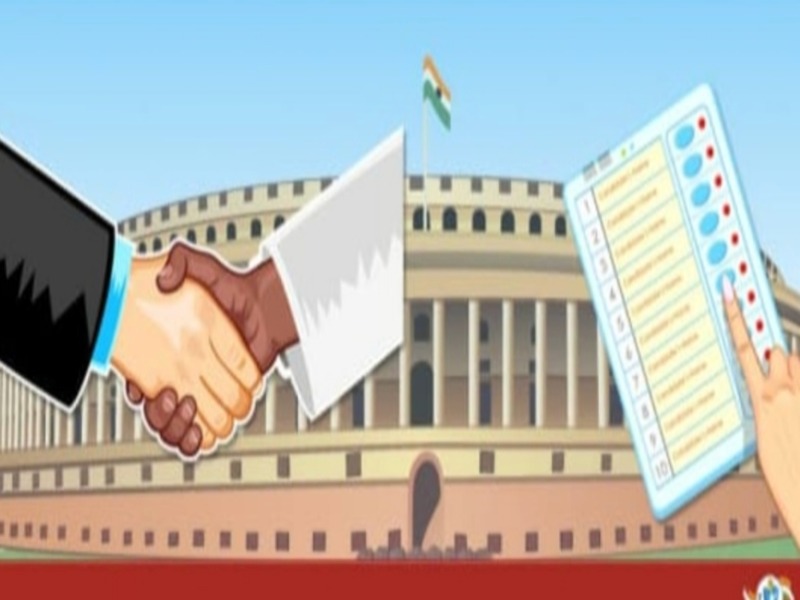Coalition politics is redefining India’s democratic landscape, fostering diverse alliances and challenging traditional power structures. As political parties collaborate, they navigate complex dynamics that influence policy-making and governance. This evolving political fabric highlights both opportunities and risks, shaping the future of India’s constitutional democracy in unprecedented ways.
“Modi’s rise was directly proportional to BJP’s attempt to turn Indian democracy presidential, with everything revolving around one person.”
The year 2024 marks an inflection point in India’s constitutional democracy. The results of the 2024 General Elections shocked many political observers. The BJP, unlike the 2014 and 2019 elections, was not able to attain a majority on its own. With the help of several regional parties headed by the BJP, a coalition government has formed a government at the Centre. Prime Minister Narendra Modi took oath for the third consecutive term, a feat that only Jawaharlal Nehru has achieved before him. However, not everything remains the same.
While the results surprised many political commentators, they relieved several constitutional observers. For the last decade, this country has become used to a certain style of governance. Modi’s rise was directly proportional to the BJP’s attempt to turn Indian democracy presidential, where everything revolved around a central figure, in this case, the Prime Minister himself.
As a result, several important constitutional positions and offices were substantially weakened and slowly rendered irrelevant. The Cabinet, ministers, Parliament, various committees of Parliament, the President, the CAG, the Election Commission, the Finance Commission, the RBI, etc., had all become pliant to one man, the Prime Minister. Resultantly, there were three significant Constitutional fallouts during the last decade.
Weakened deliberative system
Firstly, India was reduced to being merely an electoral democracy. Deliberative democracy, which is an extremely important facet of constitutional democracy and is also a basic structure of the constitution, slowly withered away. Deliberative democracy presumes that people’s aspirations will be met by discourse and deliberation amongst democratic institutions and their stakeholders.
However, a cursory look at the most important decisions over the last decade will tell you that India was anything but a democracy that believed in deliberation and consensus building. Several decisions such as demonetisation, rollout of the GST, abrogation of Article 370, enactment of the three new criminal laws, etc., were all done by keeping Parliament, the Cabinet and the States in the dark.
Secondly, there was a well-thought-out systematic attack on constitutionalism and constitutional morality. Constitutionalism presumes that the government derives its authority from, and is limited by, the Constitution and constitutional conventions established over a long period of time. Abiding by these norms and conventions would mean upholding constitutional morality. However, the last decade saw a consistent decline. Use of investigating agencies and draconian legislations to suppress political opposition, arrest of sitting Chief Ministers, quelling dissent by curtailing civil liberties, systemic intimidation of the civil society, controlling the media, homogenisation of political thought, political disenfranchisement of minorities, etc. are proof that over the last decade, constitutional morality had been reduced to just a theory in constitutional law.
Choked cooperative federalism
Thirdly, there was a clear attempt to dismantle the existing federal structure of the country. Cooperative federalism was at its lowest in the last 10 years. Regional aspirations and voices of elected State governments were ignored. States like Delhi had to move the courts for almost every issue in the last 10 years. Several other state governments with popular majorities were brought down using investigating agencies, defections and splitting of political parties.
Legislations which were to have a direct bearing on the States were imposed on them without their consultation. The statehood of Jammu and Kashmir was abolished. Even on the issue of fiscal federalism, the Union government denied the States their legitimate share in revenue. The last 10 years saw several states raising concerns over discrimination in revenue sharing between the states ruled by the BJP as against those where the opposition parties were in power.
Kerala had to move the Supreme Court seeking funds it was legally entitled to. West Bengal was denied funds that the Centre continues to owe to the State. In other words, during the last decade the Centre’s policy with respect to states where the BJP was not in power was that of confrontational federalism instead of cooperative federalism.
The coalition imperative
However, the 2024 mandate is a clear and necessary break from the past. The return of a coalition government at the Centre signifies the return of the era of consensus building, both inside as well as outside the Parliament. Deliberation and discourse will now have to become the order of the day.
Prior consultation within the cabinet, inside the Parliament, regional parties and state governments, the opposition, and important constitutional functionaries will have to become the new norm. Public institutions and constitutional offices will slowly come back to life. This will also prevent any forced homogenisation of political thought. The experience of the last decade goes on to prove that the future of constitutional democracies like India, where a multi-party system exists, is dependent on whether a coalition government is in power at the Centre or not. #hydkhabar

